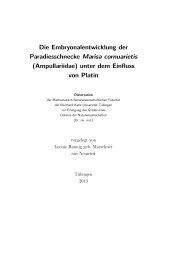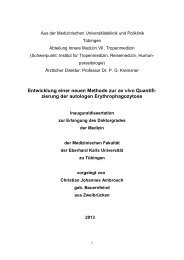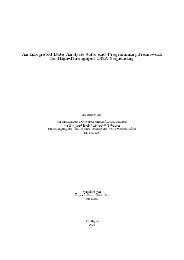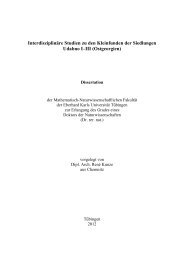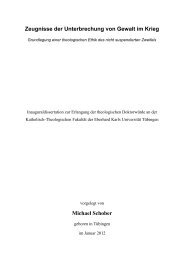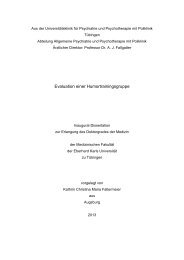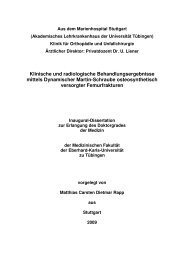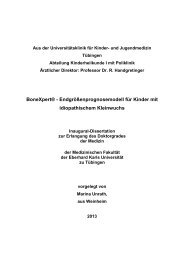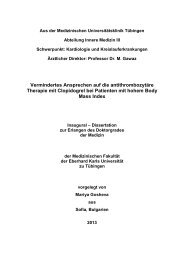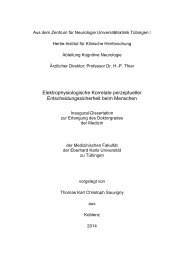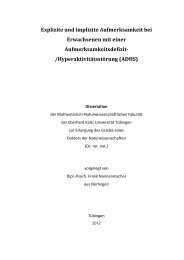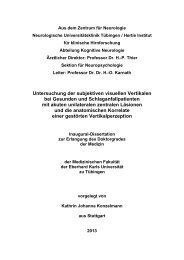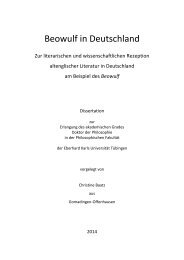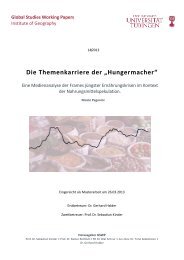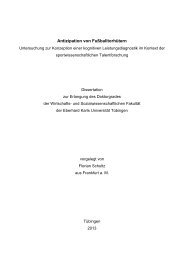- Page 1 and 2:
The influence of the place-value st
- Page 3:
Ich möchte mich an dieser Stelle b
- Page 6 and 7:
ZUSAMMENFASSUNG Das wissenschaftlic
- Page 8 and 9:
Study 5: All for one but not one fo
- Page 10 and 11:
Classification performance ........
- Page 12 and 13:
The Arabic place-value structure an
- Page 14 and 15:
Large problem size > small problem
- Page 16 and 17:
ABSTRACT ..........................
- Page 18 and 19:
Study 2: On the cognitive instantia
- Page 20 and 21:
LIST OF FIGURES Section 1: General
- Page 22 and 23:
Section 4: The neurocognitive under
- Page 24 and 25:
LIST OF TABLES Section 1: General I
- Page 26:
Section 5: A computational model of
- Page 29 and 30:
Number, the simplest and most unive
- Page 31 and 32:
limited set of symbols. To achieve
- Page 33 and 34:
interexponential structuring princi
- Page 35 and 36:
(i) separating power and base dimen
- Page 37 and 38:
Abstract Code Model Verbal number C
- Page 39 and 40:
of the Arabic number system within
- Page 41 and 42:
previous studies on two-digit numbe
- Page 43 and 44:
eview), questions concerning repres
- Page 45 and 46:
esponses are easier (i) for problem
- Page 47 and 48:
2009c). Based on the framework of t
- Page 49 and 50:
scarce (but see Domahs et al., 2006
- Page 51 and 52:
y Studies 5 and 6 of the current th
- Page 53 and 54:
OVERVIEW OVER THE STUDIES INCORPORA
- Page 55 and 56:
a view was corroborated by a variet
- Page 57 and 58:
would indicate influences of verbal
- Page 59 and 60:
2. Study 6: Impairments of the ment
- Page 61 and 62:
eplicate processes of unit-decade i
- Page 63 and 64:
determinants shall be reviewed. Mor
- Page 65 and 66:
Study 6: Hoeckner, S., Moeller, K.,
- Page 67 and 68:
Section 2 Task invariant influences
- Page 69 and 70:
ABSTRACT Over the last years, evide
- Page 71 and 72:
The authors used a magnitude compar
- Page 73 and 74:
Such congruency is important as mos
- Page 75 and 76:
Procedure: After ten randomly chose
- Page 77 and 78:
compatibility effect for large unit
- Page 79 and 80:
2004). So, increasing the maximum u
- Page 81 and 82:
proportions in earlier studies. The
- Page 83 and 84:
CONCLUSIONS In summary, the conclus
- Page 86 and 87:
Study 2 On the cognitive instantiat
- Page 88 and 89:
INTRODUCTION One of the probably mo
- Page 90 and 91:
eye fixation behaviour for the eval
- Page 92 and 93:
(see Rayner, 1998 for a review). Tr
- Page 94 and 95:
Procedure: After being seated with
- Page 96 and 97:
adjustment of the degrees of freedo
- Page 98 and 99:
Eye fixation behaviour TRT in ms To
- Page 100 and 101:
or the decade digits was found (393
- Page 102 and 103:
egressions were directed to the sec
- Page 104 and 105:
the requirement of a carry is deter
- Page 106 and 107:
In line with this prediction, total
- Page 108 and 109:
Instead, it seems to involve differ
- Page 111 and 112:
Section 3 On the importance of plac
- Page 113 and 114:
ABSTRACT The mental number line of
- Page 115 and 116:
preschoolers aged 4). However, the
- Page 117 and 118:
still represented even when only th
- Page 119 and 120:
specificity. Yet, in adults it has
- Page 121 and 122:
METHOD The reported experiment was
- Page 123 and 124:
child separately to obtain estimati
- Page 125 and 126:
indicated that Italian children’s
- Page 127 and 128:
striking similarity between the ori
- Page 129 and 130:
Inversion influences on estimation
- Page 131 and 132:
% overall Estimation Error 25 20 15
- Page 133 and 134:
seem to be the origin of the perfor
- Page 135 and 136:
this system. In this case no langua
- Page 137 and 138:
two-linear model with one linear re
- Page 139 and 140:
and 40 is 10 times as large as the
- Page 141 and 142: APPENDIX A A remark on how to evalu
- Page 143 and 144: Splitting the overall interval in t
- Page 145 and 146: much closer to the proposed breakpo
- Page 147 and 148: the individual approach may be more
- Page 149 and 150: Contrarily, data produced by a two-
- Page 151 and 152: Study 4 Early place-value understan
- Page 153 and 154: INTRODUCTION Dealing with (multi-di
- Page 155 and 156: has been shown that other represent
- Page 157 and 158: number system as formalized by its
- Page 159 and 160: 124 10024, see Deloche & Seron, 19
- Page 161 and 162: Please note that in contrast to Miu
- Page 163 and 164: Roid, Prifitera, & Weiss, 1993; see
- Page 165 and 166: effect-based approach has never bee
- Page 167 and 168: (ii) In the magnitude comparison ta
- Page 169 and 170: problem of capitalizing on differen
- Page 171 and 172: Error rate in % Error Categories (c
- Page 173 and 174: positively correlated with overall
- Page 175 and 176: (ii) Effect approach analyses of pr
- Page 177 and 178: whether the carry effect for additi
- Page 179 and 180: Non-carry problems: For the percent
- Page 181 and 182: from basic numerical concepts to ar
- Page 183 and 184: transcoding and/or who showed relat
- Page 185 and 186: A word on the validity of the curre
- Page 187 and 188: e adapted for the results of the pr
- Page 189 and 190: Non-monotonous Model of the Relatio
- Page 191: of the probes unit and/or decade di
- Page 195 and 196: Therefore, we believe that this stu
- Page 197 and 198: APPENDIX A: Correlation tables of s
- Page 199 and 200: Section 4 The neurocognitive underp
- Page 201 and 202: ABSTRACT Mental arithmetic and calc
- Page 203 and 204: manipulations cannot be distinguish
- Page 205 and 206: numbers is assumed to be more preci
- Page 207 and 208: correctly bisected by the second nu
- Page 209 and 210: Table 1: Behavioural performance in
- Page 211 and 212: were found bilaterally in the dorso
- Page 213 and 214: Table 3: Brain areas activated by b
- Page 215 and 216: portion of the superior frontal gyr
- Page 217 and 218: Figure 3: fMRI signal for parametri
- Page 219 and 220: The fronto-parietal network and the
- Page 221 and 222: Finally, increased activation in th
- Page 223 and 224: Inferior parietal cortex, the angul
- Page 225 and 226: primarily necessary for solving the
- Page 227 and 228: Tippet (1996) have shown that patie
- Page 229 and 230: Study 6 Impairments of the mental n
- Page 231 and 232: INTRODUCTION Patients suffering fro
- Page 233 and 234: 2005), triplets in which the interv
- Page 235 and 236: Visual field assessment showed no s
- Page 237 and 238: Table 1: Demographic and clinical d
- Page 239 and 240: For 80 bisected triplets the factor
- Page 241 and 242: Factorial Analyses (ANOVA and t-tes
- Page 243 and 244:
Errors: The ANOVA revealed a main e
- Page 245 and 246:
DISCUSSION The effects of neglect o
- Page 247 and 248:
decade digits but they even process
- Page 249 and 250:
strategic value of retrieving this
- Page 251 and 252:
APPENDIX A Test results of patients
- Page 253 and 254:
the middle the beneficial effect of
- Page 255 and 256:
229
- Page 257 and 258:
Study 7 Two-digit number processing
- Page 259 and 260:
INTRODUCTION The internal represent
- Page 261 and 262:
all numbers the overlap for larger
- Page 263 and 264:
digit numbers were engaged. Additio
- Page 265 and 266:
single node in an ordered sequence
- Page 267 and 268:
modelling to evaluate the plausibil
- Page 269 and 270:
A Output Layer 11 99 11 #1 #2 99 In
- Page 271 and 272:
expected considering their magnitud
- Page 273 and 274:
the output of the right node would
- Page 275 and 276:
advantages for these numbers (see a
- Page 277 and 278:
Finally, a regression analysis only
- Page 279 and 280:
236) = 417.38, p < .001] and incorp
- Page 281 and 282:
Regression The stepwise regression
- Page 283 and 284:
compared numbers, unit distance, lo
- Page 285 and 286:
RT in ms 780 770 Compatible Number
- Page 287 and 288:
esponse latencies increased as dist
- Page 289 and 290:
Table 5: Predictors included in the
- Page 291 and 292:
Taken together, these results revea
- Page 293 and 294:
of overall distance necessarily req
- Page 295 and 296:
most important predictor in a multi
- Page 297 and 298:
activation of the output layer is a
- Page 299 and 300:
The nature of the representation of
- Page 301 and 302:
Thereby, possible interactions and
- Page 303 and 304:
decomposed model did not include an
- Page 305 and 306:
APPERNDIX B Development of connecti
- Page 307 and 308:
Figure C: Development of connection
- Page 309 and 310:
Figure E: Development of connection
- Page 311 and 312:
Interestingly, one might infer from
- Page 313 and 314:
Section 6 Summary 287
- Page 315 and 316:
may be determined by the presentati
- Page 317 and 318:
tens and units: German-speaking chi
- Page 319 and 320:
Study 6 examined the influence of t
- Page 321 and 322:
295
- Page 323 and 324:
GENERAL DISCUSSION In the last sect
- Page 325 and 326:
to-be-evaluated triplet crossed a d
- Page 327 and 328:
specific processing of place-value
- Page 329 and 330:
explanation of the decade consisten
- Page 331 and 332:
verbal recoding of tens and units d
- Page 333 and 334:
system and the ordinality of the me
- Page 335 and 336:
epresentation itself as well as its
- Page 337 and 338:
Furthermore, converging evidence is
- Page 339 and 340:
methodological problems. In most of
- Page 341 and 342:
jittering the positions of the sequ
- Page 343 and 344:
numbers within the triplets, proces
- Page 345 and 346:
Pollatsek, 1989) states that an obj
- Page 347 and 348:
computational models were programme
- Page 349 and 350:
The developmental influence of plac
- Page 351 and 352:
correspond to the order of tens and
- Page 353 and 354:
Asian languages (e.g., Japanese, Ko
- Page 355 and 356:
indicating that decomposed processi
- Page 357 and 358:
REFERENCES Banks, W. P. (1977). Enc
- Page 359 and 360:
Karmiloff-Smith, Annette (1996). Be
- Page 361 and 362:
Pixner, S. (2009). How do children
- Page 363 and 364:
337



